commentary Commentary
Commentary: Why many under 45 are hoping vaccination slots open in June
Those in Singapore under 45 may be able to sign up for vaccination starting June, says Senior Minister of Health Janil Puthucheary. Until then, what might be needed but is in short supply is patience.
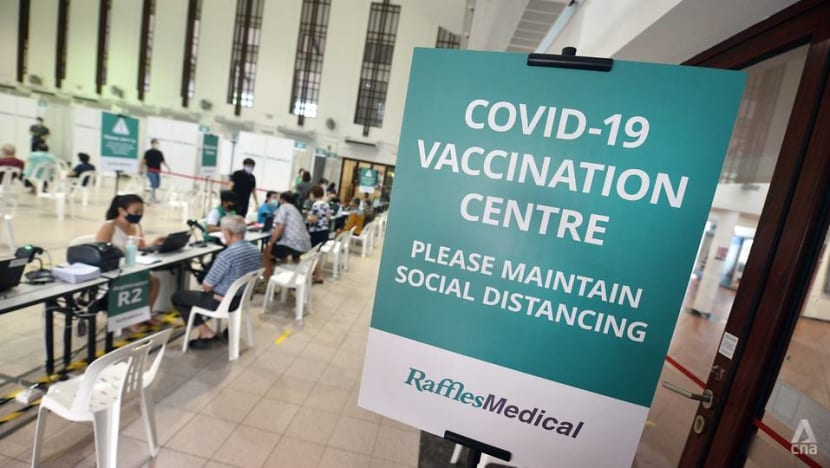
A COVID-19 vaccination exercise at Tanjong Pagar Community Centre in Singapore on Jan 27, 2021. (File photo: CNA/Jeremy Long)
SINGAPORE: When news broke on Monday (Apr 5) the Government had plans to invite those below 45 to book their COVID-19 vaccination shots from June, my chat groups lit up.
People discussed how many would sign up once appointments were available - and the response seemed unanimous.
“Me! Travel!” said one.
A sea of “Yes!” appeared on my phone.
“I’ve registered my interest already,” one friend replied, indicating she had filled up the Google sheet from the Health Ministry despite not being in the segments eligible for vaccination.
“But we (appear to be) backlogged,” she pointed out, urging everyone to have some patience.
READ: Commentary: Here’s why taking the vaccine is necessary even if it’s optional
THE VACCINATION IMPERATIVE
When the first COVID-19 vaccine burst onto the scene at the end of 2020, it sent shockwaves around the world.
After all, the dust had barely settled on billionaire philanthropist Bill Gates’ stunning projection last April during the height of the first wave of infections that the first vaccine would be ready in 12 months.
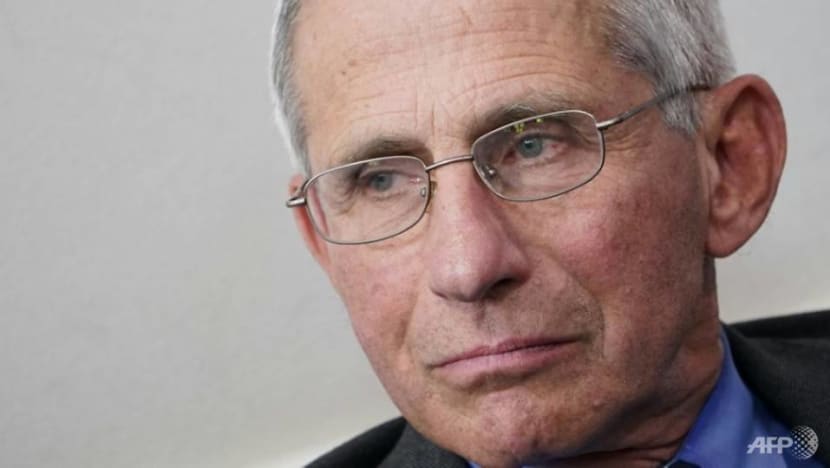
Even the forecast from the face of the American fight against the coronavirus, Dr Anthony Fauci, who suggested a 12 to 18 months time frame for a vaccine to land in the US, was deemed by infectious disease experts to be “staggeringly fast”.
Against all odds, however, COVID-19 galvanised global collective action and human ingenuity on an unprecedented scale that channelled needed funding, expertise and volunteers to big pharmaceuticals, with healthcare systems and logistics stars aligning.
We probably have US Operation Warp Speed to thank in part. But few of us could scarcely believe our luck after such a rotten year.
READ: Commentary: We need to talk about how Donald Trump’s presidency wasn’t a complete disaster
And so a different kind of problem faced many authorities around the world when the first coronavirus vaccines were ready to ship. They had to deal with a great wall of scepticism.
Here in Singapore, co-chairs of the multi-ministry task force Lawrence Wong and Gan Kim Yong, along with members of the Expert Committee for COVID-19 Vaccination, got swiftly into action to give reassurances that “no corners were cut” in Singapore’s roll-out and tackled concerns over side-effects and long-term repercussions in January - to convince people to take the vaccine.
READ: Commentary: Misinformation threatens Singapore’s COVID-19 vaccination programme
Around the world, national leaders like Prime Ministers Lee Hsien Loong, Muhyiddin Yassin and US President Joe Biden literally took a shot to set an example and allay residual fears.
THE BENEFITS ARE COMING INTO SHARPER FOCUS
Months on, authorities may find a new conundrum on their hands: How soon people can get their hands on a vaccine, now that more are convinced of its merits, as prospects of returning to a pre-pandemic normalcy come into sharper focus.
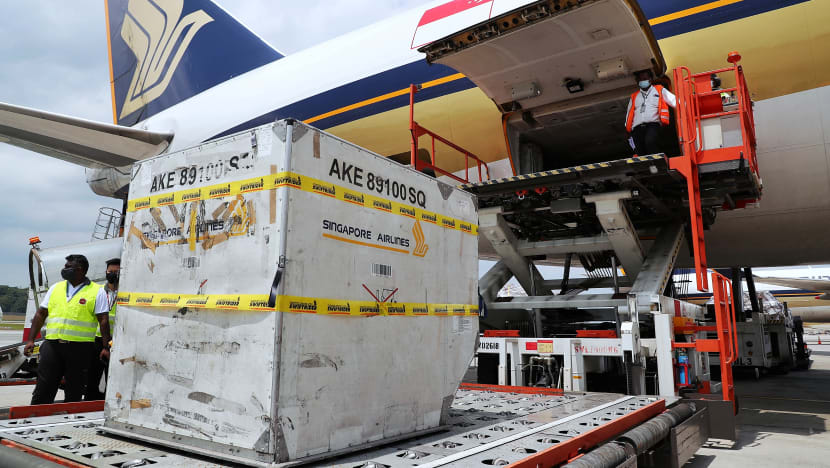
“All of us wish to exit this degree of mask-wearing, lockdowns and restrictions on movements. Vaccines aren’t going to be the full story, but they’re going to be an important part of the journey,” dean of the NUS Saw Swee Hock School of Public Health Professor Teo Yik Ying told me on CNA’s Heart of the Matter podcast in January.
Apart from the protection it affords those around us, especially children, pregnant women and more who cannot take the vaccine, many of us are longing to get that jab soon, in the hopes for bigger group gatherings, events and more.
Of course, the real million-dollar question for many Singaporeans is whether vaccinations could mean travel with fewer restrictions, chiefly without quarantine.
There are growing signs vaccinations could loosen such curbs. Hong Kong said on Thursday (Apr 15) it will reduce the quarantine period for fully vaccinated travellers by seven days, potentially from end-April onwards.
READ: Commentary: Singapore-Australia air travel bubble is sensible but politically challenging
Implementing the idea of a vaccination certificate may not be straightforward. Much depends on tech and diplomacy, in whether such certs can be secure and tamper-free, not to mention accepted and verifiable across countries, Transport Minister Ong Ye Kung earlier pointed out in Parliament on Apr 5.
The science must also bear out, with more data needed to assess if changes to border measures can be applied across all vaccines, as Senior Minister of State for Health Janil Puthucheary added.
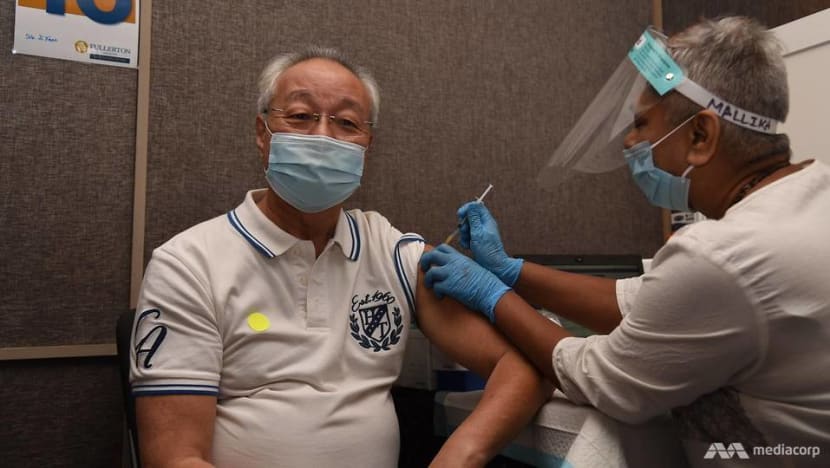
But setting aside the caveats, the upsides of establishing vaccination certs look pretty good, even outside the realm of leisure travel.
“People have missed important family occasions … if you have elderly parents in Malaysia you can’t go and see them, you can’t even go for funerals sometimes. By being disciplined about vaccinations, if we reduce our risk of infection, it will allow us certain freedoms.” Associate Professor Lim Poh Lian, member of Singapore’s Expert Committee for COVID-19 Vaccination, pointed out on the same podcast in January.
Easing travel restrictions could also help our economy, she said. “Travel is a lifeblood for Singapore, both as a transport and business hub. We know this virus can cause pre-symptomatic transmission … by vaccinating people, if you can drop that risk to 95 per cent, that is a huge thing in risk mitigation.”
A Japan Centre for Economic Research has also revised estimates of 2021 economic growth for Singapore from 4.5 per cent previously to 6.1 per cent, on the assumption of a successful vaccination programme.
READ: Commentary: Japan’s slow-mo vaccination programme has a lot riding on it
Explaining how the effect will not be immediate, Prof Teo had also highlighted how people should refrain from procrastinating once a shot is available: “From the time of receiving a vaccine to the time it truly protects you, you’re looking at a month, five weeks or more … a vaccine by nature is meant to be preventive, to protect people.”
Perhaps that call to jettison a wait-and-see approach has been overly successful, when some eligible Singapore netizens in the 45 and above age groups say they’ve been waiting for a response after registering to no avail.
We now know that 200,000 people aged 45 to 59 remain are on a holding list as of Apr 12 but should be receiving booking links by mid-May, according to the Health Ministry.
(Listen to Prof Teo and Associate Professor Lim the behind-the-scenes considerations and discussions going into what might be Singapore’s biggest vaccination programme ever on CNA's Heart of the Matter podcast:)
KEEP CALM AND CARRY ON
Then again, Singapore has not been under “quite as much pressure” to get the population vaccinated quickly, given the low number of local cases, Prime Minister Lee Hsien Loong said in an interview with the BBC in March.
“There’s time for us to explain to people, persuade them and dispel their worries and anxieties and to do it in a systematic way,” he said, highlighting the benefits of taking a slow and steady approach that includes keeping a lid on infection numbers.
All things considered, perhaps Singapore’s vaccination programme is proceeding at a Goldilocks pace – not too fast to spook undecided folks but not too slow such that frustration breeds indifference or even resistance.
Crucially, about 60 to 70 per cent of eligible seniors aged 60 and above have received vaccinations or booked their appointments.
READ: Commentary: This 71-year-old wants you to get a COVID-19 vaccine once you can. Here’s why
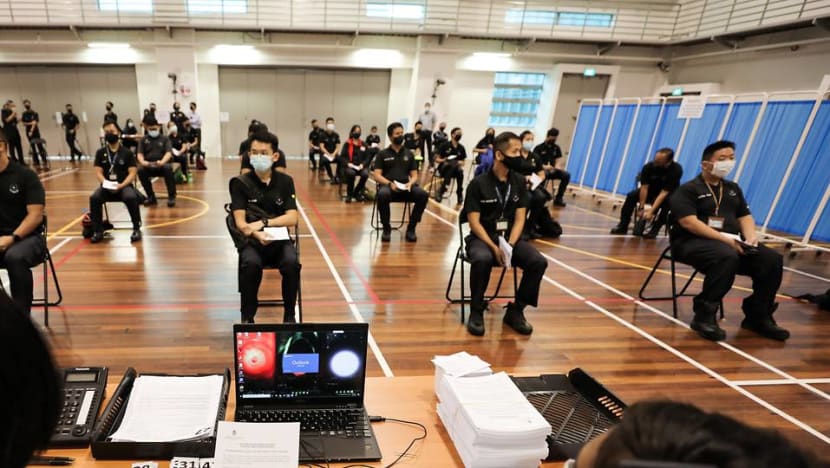
Still, PM Lee himself noted the importance of getting people vaccinated once shots are ready given the uncertainty COVID-19 has wrought on best laid plans: “The virus moves very quickly … Every time you think you are about safe to start (travel bubbles), something happens.”
To be sure, vaccination does not offer a panacea when there are still questions over how long immunity lasts for and to what extent transmission is prevented.
News of a dormitory resident contracting the coronavirus despite having completed the full COVID-19 vaccination regimen has been a sobering reminder of that possibility.
For now, for those of us aged 45 and below looking forward to that possibility of getting our shots come June, as my astute friend noted, we can only keep calm and carry on.
Lin Suling is executive editor at CNA Digital News where she oversees the Commentary section and hosts the Heart of the Matter podcast.














